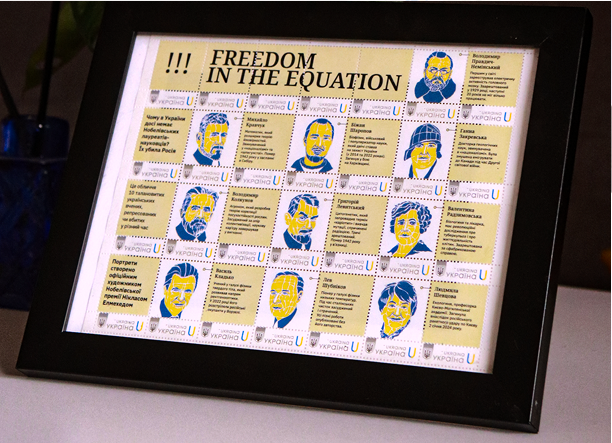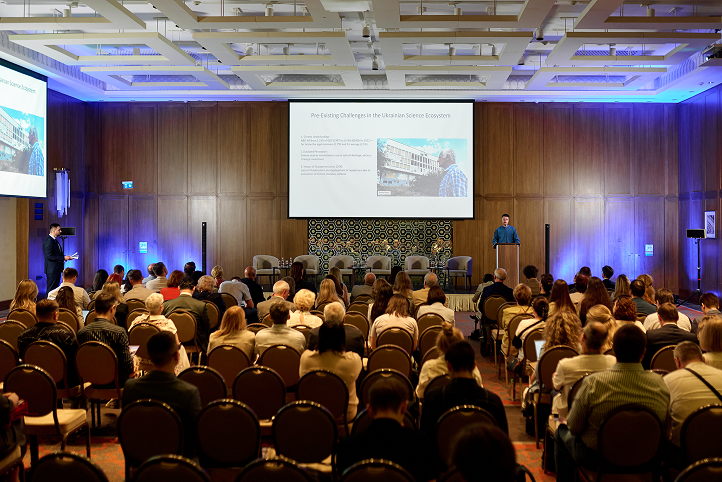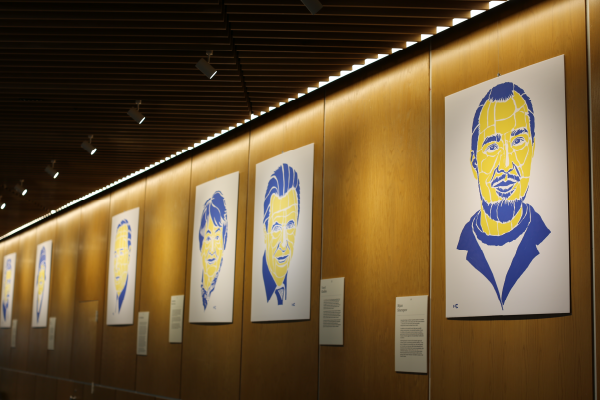

Impact of War on Science and Academic Communities: Vulnerability and Responsibility of Scientists
26.01.24
Nina Chala is a Doctor of Science in Public administration and a professor at the Department of Marketing and Business Management at National University "Kyiv-Mohyla Academy". Additionally, she serves as the head of the Center for Analytics and Business Modeling for Sustainable Development. In her work with Science at Risk, she focuses on preserving human potential in science.
Armed conflicts often catch civilians off guard. For instance, Russia's full-scale invasion on February 24, 2022, despite partial occupation of Ukrainian territory since 2014, was unexpected. Similarly, the massive rocket strike by Hamas on Israeli territory on October 7, 2023, took many by surprise, despite the longstanding conflict.
The Global Economic Forum's 2023 Risk Analysis indicates military actions in Ukraine, highlighting 110 simultaneous conflicts worldwide. In contrast, the 2022 forum identified major risks in low COVID-19 vaccination rates in low-income countries, climate change, and space competition. This implies that, despite the prolonged conflict in Ukraine, not only ordinary citizens but also some international experts failed to foresee new dangers.
The migration of scientists enhances the universities and research institutions of the host country
During armed conflicts, people become vulnerable, focusing on basic needs and survival. The direct threat to the lives and health of civilians generates migration flows to safer places, disrupting professional networks and connections.
Migration waves often have catastrophic and long-term consequences for the scientific institutions of the departing country. For example, the emigration of Jewish scientists from Nazi Germany reduced the number of philosophy doctorates among faculties, leading to the dismissal of top-class mathematicians.
Fabian Waldinger's research shows that before World War II, Göttingen and Berlin universities in Germany together produced over 20% of all mathematics Ph.D. candidates. The top five German universities trained about 28% of all mathematics Ph.D. candidates at that time. By 2010, these top five German universities had produced about 8.5% of all mathematics Ph.D. candidates. Waldinger argues that the deterioration of Ph.D. candidate training organization was a significant factor contributing to the decline of German science after World War II. In another study, he demonstrates a significant impact on young scientists who lack strong professional connections.For instance, in 1933, Albert Einstein emigrated from Germany to the USA due to the persecution of Jews. In the same year, to rescue academics from the Nazis, the Council for At-Risk Academics (CARA) was created. The mission of this program is to support scholars in danger or fleeing conflicts worldwide. In collaboration with UK universities and research institutes, CARA assists over 200 fellows and their families while implementing regional programs for Syrian scientists in exile.
For example, in 2022, Cardiff Metropolitan University supported the National Pedagogical University of Skovoroda in Kharkiv, providing access to educational resources. Also, works by students from Ukrainian universities were showcased at the Cardiff School of Art and Design's Summer Show and Exhibition in 2022 and 2023.In their latest report, CARA highlighted the surge in requests from scientists seeking support amidst heightened political crises and armed conflicts across the globe. For instance, crises in Afghanistan and Russia's full-scale invasion of Ukraine led to a significant increase in applications, soaring from 160 in 2020-2021 to 1105 in 2021-2022. Scientists from Afghanistan and Ukraine accounted for approximately 63% and 19% of new applications, respectively. In 2022-2023, the number of requests, particularly from Afghanistan, decreased significantly, totaling 547 for the year.
Towards the end of 2022-2023, a new conflict erupted in Sudan. Some scientists sought refuge in remote areas of the country, hoping for safety, but faced difficulties in staying connected with the outside world. Others attempted to flee but encountered issues with documentation and visas. Meanwhile, some were already abroad and faced challenges returning home. In September 2023, CARA received twice as many new applications from Sudanese scientists compared to those from Ukraine. With the unfolding events in Gaza, an increase in applications from scientists in this region is anticipated.
Researchers worldwide continue to face discrimination, persecution, suffering, and violence. In response, the international scientific community unites to assist, and one such initiative is the global network "Scholars at Risk" (SAR).SAR is an international network with over 600 higher education institutions in 42 countries, dedicated to protecting the rights of scholars worldwide. It also aims to raise awareness, understanding, and respect for the principles of academic freedom, including freedom of expression, ideas, and research. SAR's activities focus on three main areas: providing shelter, advocacy, and education. This includes organizing temporary research and teaching positions globally, offering advisory services to universities willing to provide shelter. SAR's advocacy work is dedicated to promoting and safeguarding academic freedom, engaging a broad public in these efforts. Between September 1, 2021, and August 31, 2022, a total of 391 attacks on higher education communities were documented across 65 countries.
Science is not separate from politics
The lessons from the Balkan Wars of 1991-1999 highlight that the decline in the productivity of scientists was not only linked to leaving the country but also to the breakdown of scientific connections and the isolation of scholars from the international community. Studies on the recovery of scientific output after the Balkan Wars in 1999 and 2000 show increased publication activity in Croatia (37,3% and 12,5%), Slovenia (10,9% and 52,8%), Macedonia (5% and 6%), and Montenegro (75% and 66%), but a decrease in Serbia for 10,2% and 27,9%, compared to 1998. There was also a significant 60% drop in scientific production in Bosnia and Herzegovina. Researchers attribute this to the fact that the most intense combat occurred in Bosnia and Serbia. A small number of educators and researchers in biomedical sciences in Split and Osijek produced more publications per capita during the wartime period than a larger number of their counterparts in two other centers.
The scientists’ responsibility extends beyond their research interests
Scientists, often at the forefront of knowledge and innovation, face not only immediate threats to their lives and health, but also restrictions on their academic freedoms and the ability to conduct research and create innovations.
Annual reports from various international organizations, including CARA and SAR, highlight cases of academic freedom violations and risks to the lives of scientists in countries such as Afghanistan, Bangladesh, China, Colombia, Hong Kong, India, Iran, Mexico, Myanmar, Nicaragua, Russia, Sudan, Sri Lanka, Turkey, Ukraine, and the USA.
In China, the government used an extensive surveillance tool, including student informants, to suppress dissent both at home and internationally. In Afghanistan, the Taliban imposed a complete ban on women pursuing higher education, specifically prohibiting their admission to universities. Taliban forces carried out reprisals against students and educators who protested against their educational policies. Female students were evicted from dormitories, and outspoken researchers were arrested and killed. In Myanmar, the armed conflict and political arrests following the military coup in February 2021, which led to the rise of a new military junta, devastated the higher education sector. Students and researchers who were part of the political opposition faced arrests and detentions, with the junta imposing severe sentences, including the death penalty, life imprisonment, and decades of imprisonment, some of which involved forced labor.
Simultaneously, scientists bear responsibility to society as representatives of the intellectual community, creators of new knowledge, and researchers seeking to delve into the essence of problems. The responsibility of scientists during times of war transcends their research and experience. For instance, during the bombing of Aleppo, scientists from the university conducted live broadcasts in multiple languages to inform the world about the situation in the city.
In the modern world, where geopolitical and social conflicts can significantly impact the academic community, it is crucial to support initiatives aimed at protecting scientists and preserving academic freedom.
The history of military conflicts demonstrates that the loss of scientific potential and the detachment of scientists from the international community can lead to a substantial reduction in the productivity and innovative potential of national science. The responsibility of scientists goes far beyond their research interests and becomes an inseparable part of their role in society. In times of war and conflicts, the scientific community plays a crucial role in ensuring the protection and support of those in danger, as well as in disseminating objective information about the situation.

